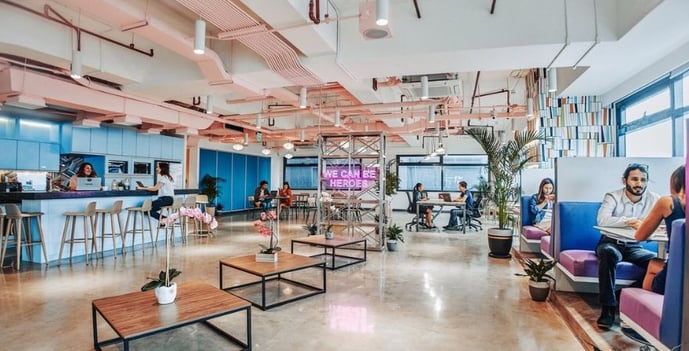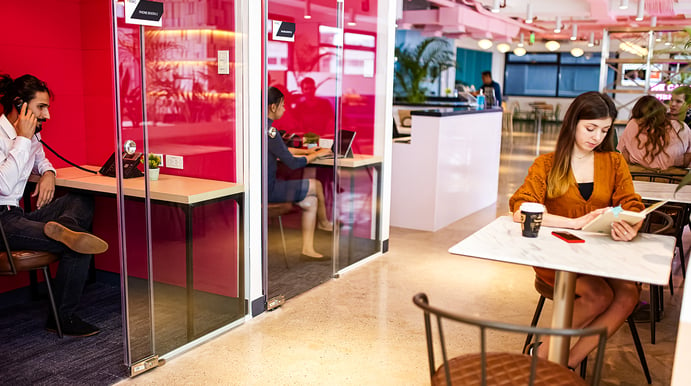
Coworking brings together a diverse mix of industries and professions in a shared workspace. Offices are ready-made and offer flexible lease terms. Initially, the coworker base was made up of freelancers and startup enterprises. Today, larger companies are also taking advantage of the flexible office model, especially when expanding abroad.
The coworking industry is growing rapidly in the Philippines. Currently, there are 135 flexible offices in Metro Manila alone. By 2030, thirty percent of commercial real estate could be coworking space, according to JLL Philippines. Key drivers of regional growth are the millennial generation, startups, and multinational corporations.
Why Millennials Prefer Coworking Spaces

The traditional workplace is not as appealing to younger workers. According to a Deloitte survey, 87% of Filipino millennials participate in the “gig economy” or are considering taking part. These young freelancers seek freedom, flexibility, and convenience. Coworking is a natural fit. A lease or membership can last as little as an hour, or as long as a year or more. A variety of workspace options are available: temporary desks, permanent desks, shared tables or private offices.
Most operators are open 24/7, and larger providers have several locations, allowing millennials to work when and where they choose. Through the use of apps, such as FlySpaces, users can browse thousands of flexible workspaces in the Philippines and reserve their spot with a credit card. From booking to occupancy, coworking spaces offer the end-to-end convenience the "Now Generation" craves.
Millennials also care about workplace design. According to Forbes, over half of them say it impacts their job satisfaction and motivation levels. Coworking offices typically have an inviting, multipurpose layout. There are spaces for individual work, collaboration, socializing, and wellness. Beyond the typical serviced office, coworking spaces often offer lounges, napping areas, game rooms, gyms, and gardens. According to the Harvard Business Review, such amenities humanize the workspace and help workers thrive.
Benefits of Coworking Spaces for Startups

Metro Manila is one of the world's top destinations for startups. In the 2019 Global Startup Ecosystem Report, it ranked among the top five cities in terms of value for money. To grow the industry further, the Philippine Congress passed the Innovative Startup Act. The bill offers incentives to startup enterprises, such as tax breaks, grants, and loosened immigration requirements for employees.
Though big on ideas, many startups are low on resources. Coworking space can offer them an affordable and flexible office solution. These spaces can remove the obstacle of finding office space and outfitting it with IT and furniture. Startups can also rent plug-and-play offices and workstations. The flexible terms of coworking spaces will allow them to scale quickly as they grow. Through this office setup, they can establish their enterprises in the CBD or other prime locations, giving them access to a reputable address.
The collaborative atmosphere found in coworking spaces is another advantage. Coworking allows startups to network with other startups, established companies, and professionals of every stripe. They have access to expertise and experience not found in the average office. Some local operators actively nurture this incubator/innovator culture. Manila-based KMC Solutions offers six months free rent to promising startups, courtesy of their "Space for Ingenious" program. They also provide training programs and mentorship with industry leaders.
Multinational Corporations Join the Coworking Trend

According to Colliers International, multinational companies (MNCs) are now occupying thousands of coworking desks in Southeast Asia. Flexibility is the chief reason for this migration away from traditional office space. Forty-four percent of corporate clients state it was their top priority, surpassing even cost reduction. Without the confines of a long-term lease, workers can be mobilized around the globe. New markets can be tested. Teams can be sent abroad for short-term projects, or housed while regional headquarters are built. These employees are monitored remotely through integrated technology.
Many coworking operators lease more than just physical space; clients can also lease staff. Rather than transplanting employees, local workers can be hired at a fraction of the price. Two employee models exist — BPO and KPO. Business Process Outsourcing (BPO) employees handle back-office services such as customer service, data entry, HR, and payroll. Knowledge Process Outsourcing (KPO) employees offer more specialized skills, such as legal services, marketing, design, engineering, and other areas of expertise. The leasing company handles all recruitment, onboarding, HR, and payroll.
New accounting regulations are also a factor. Since 2019, the International Accounting Standard Board (IASB) has been requiring corporations to disclose their real estate obligations. Compliance with this regulation will add over US$2 trillion of debt to the company balance sheets. It will also broadcast the company's real estate strategy. To avoid disclosure, MNCs are increasingly moving to coworking spaces.
Better Business Through Coworking Spaces

Today's businesses and employees require flexibility in how, when, and where they work. Coworking offers a host of locations and 24/7 access, allowing freelancers to determine their schedule. The spaces feature striking design and layouts that balance collaboration with privacy. Startups can optimize their budget and network with other enterprises within these spaces. Multinationals are also able to benefit through accommodating lease terms and affordable labor.
According to Colliers, flexible workspace is an enduring trend, and the Philippine market is expected to grow for years to come.
RELATED: Coworking Space or Coffee Shops: Where to Work on the Go
A Renaissance of Startup Tools: New Resources Available for Startups
3 Reasons Why Moving Offices Can Be Good For Your Organization
What are your thoughts on Why Coworking is a Growing Trend in the Philippines? Let us know all about it.

What are your thoughts on Why Coworking is a Growing Trend in the Philippines? Let us know all about it.
Posted by Kyle Edriel Tomagan
Kyle Tomagan co-manages Workspace in Asia. A writer with a knack for research and in-depth storytelling, he brings ingenuity and flair to any piece he writes; be it about flexible workspace, politics, video games, comic books, or sports.
Google+Comments